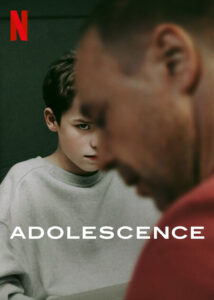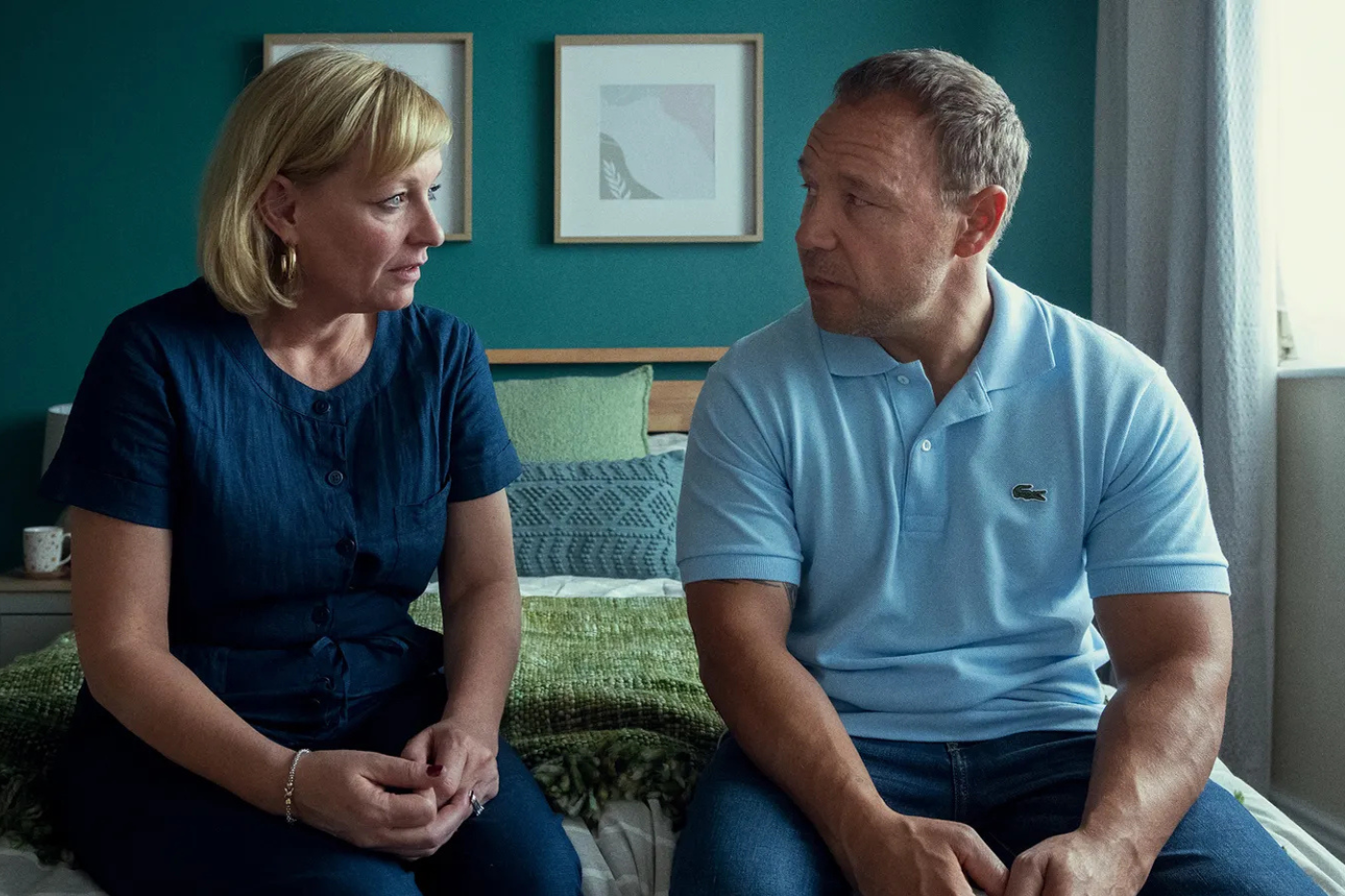Netflix’s latest legal thriller, Adolescence, directed by Philip Barantini, has arrived with a bang, offering viewers a taut, four-episode series that unfolds in real-time through the ambitious single-shot technique.
Premiering on March 13, 2025, this British drama isn’t just a showcase of technical prowess—it’s a raw, unsettling exploration of teenage psychology, masculinity, and the societal pressures that shape young minds. Created by Stephen Graham and Jack Thorne, and featuring a stellar cast including Graham, Ashley Walters, Erin Doherty, and newcomer Owen Cooper, Adolescence transcends its gimmick to deliver a narrative that’s as emotionally resonant as it is visually striking.
The Premise: A Teen Caught in a Legal and Emotional Vortex
The series kicks off with a heart-pounding raid on the Miller family home, where 13-year-old Jamie (Owen Cooper) is arrested for murder. As his bewildered parents (Stephen Graham and Christine Tremarco) and sister (Amélie Pease) grapple with the chaos, the camera follows the action in a continuous take, immersing viewers in the disorienting immediacy of the moment. From the arrest to the police precinct, the first episode mirrors the family’s confusion and desperation, refusing to let the audience off the hook with convenient cuts or exposition.

Each subsequent episode jumps forward in time, shifting focus between the investigation led by detectives Bascombe (Walters) and Frank (Faye Marsay), a psychological evaluation with Dr. Ellis (Doherty), and the Miller family’s unraveling lives. The one-shot format adapts to each chapter’s tone—building suspense in the raid, chaos in the school investigation, intimacy in the therapy session, and raw emotion in the family-centric finale. But beyond the technical feat lies a deeper story about adolescence itself: a period defined by vulnerability, identity struggles, and the collision of internal and external forces.
The Psychology of Adolescence: A Fragile Mind Under Pressure
At its core, Adolescence is a psychological portrait of Jamie, a boy caught in a web of accusation and societal expectation. Owen Cooper’s performance is nothing short of revelatory, capturing the quiet defiance, fear, and fragility of a 13-year-old facing a murder charge. The third episode, a two-hander between Jamie and Dr. Ellis (Erin Doherty), is a standout, peeling back layers of his psyche in a single, unbroken conversation. Doherty’s probing psychologist draws out flashes of anger and vulnerability, hinting at the turmoil beneath Jamie’s stoic exterior.
Psychologically, adolescence is a crucible—a time when the brain is still developing, particularly the prefrontal cortex, which governs impulse control and decision-making. Jamie’s story reflects this developmental tension, raising questions about accountability and influence. The series name-drops Andrew Tate, a figure synonymous with toxic masculinity, as a cultural specter haunting young boys like Jamie. Reddit users have latched onto this thread, with one commenter noting, “The show nails how kids today are bombarded with these hyper-macho role models online—it’s scary how that shapes them before they even know who they are.” Another user added, “Jamie’s silence feels so real. Teens don’t always have the words to process what’s happening to them.”
The narrative also touches on bullying and revenge porn, contemporary issues that amplify the pressures of adolescence. These elements suggest Jamie’s alleged crime—if he committed it—may stem from a cascade of external triggers rather than inherent malice. This aligns with psychological theories like Bandura’s social learning model, which posits that behavior is learned through observation and imitation. Adolescence asks: How much of Jamie’s actions are his own, and how much are a reflection of a toxic environment?
Masculinity and Societal Indifference
While Jamie’s journey anchors the series, Adolescence casts a wider net, examining masculinity in its various forms—toxic, fragile, and redemptive. Stephen Graham’s Eddie, Jamie’s father, embodies a desperate paternal instinct, his performance peaking in the devastating fourth episode as he navigates guilt, rage, and love. Reddit reviews praise Graham’s versatility, with one user writing, “He’s the heart of the show—every scene with him feels like a punch to the gut.”
Yet the series doesn’t shy away from critiquing societal blind spots. The victim’s best friend, played with fierce intensity by Fatima Bojang, highlights the collateral damage of adolescence’s darker side—particularly for girls. Her brief but powerful appearance underscores a key flaw noted by critics and viewers alike: the show’s focus on male experiences sometimes overshadows the female perspective. A Reddit thread debated this, with one user arguing, “It’s a missed opportunity—they could’ve explored how girls navigate this mess too,” while another countered, “Maybe that’s the point: society doesn’t care enough about the girls either.”
This indifference ties into psychological concepts like empathy gaps, where individuals and systems fail to fully grasp others’ pain. Adolescence suggests that the legal and social frameworks surrounding Jamie—and the unseen victim—are ill-equipped to address the nuanced realities of teenage life.
The One-Shot Technique: A Window Into the Mind
The continuous-take approach isn’t just a stylistic flex—it’s a psychological tool. By denying viewers the relief of cuts, Barantini mirrors the relentless pressure of adolescence itself. The first episode’s procedural slog—fingerprinting, tests, a bleak breakfast—echoes the powerlessness teens often feel. The chaotic second episode, set in a school, reflects the overstimulation of that environment, while the third’s confined therapy session mimics the introspective isolation of self-reflection.
Reddit users have mixed feelings about the technique. “The oner in episode two was insane—felt like I was drowning in the noise,” one wrote, while another admitted, “Sometimes it’s too much. I wanted a break from the intensity.” Yet most agree it enhances the storytelling, with one fan noting, “It’s like you’re trapped in their heads—no escape, just like real life.”
A Dark, Downbeat Triumph
Adolescence doesn’t offer easy answers. The mystery of Jamie’s guilt or innocence takes a backseat to broader questions about growing up in a world of blurred moral lines and pervasive digital influence. Its technical ambition is matched by its emotional depth, thanks to a cast that delivers career-defining performances under grueling conditions. As one Reddit reviewer put it, “Owen Cooper and Erin Doherty in that therapy episode—holy shit, that’s acting you can’t fake.”
For all its strengths, the series isn’t perfect. Its focus on masculinity occasionally sidelines other narratives, and its unrelenting bleakness might not suit every viewer. But as a psychological study wrapped in a legal thriller, Adolescence is a triumph—proof that the one-shot gimmick can be more than a stunt when paired with a story this compelling. In a media landscape obsessed with prestige TV, Netflix’s latest gem stands out not just for how it’s made, but for what it dares to say about the fragile, fraught journey from childhood to adulthood.
